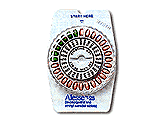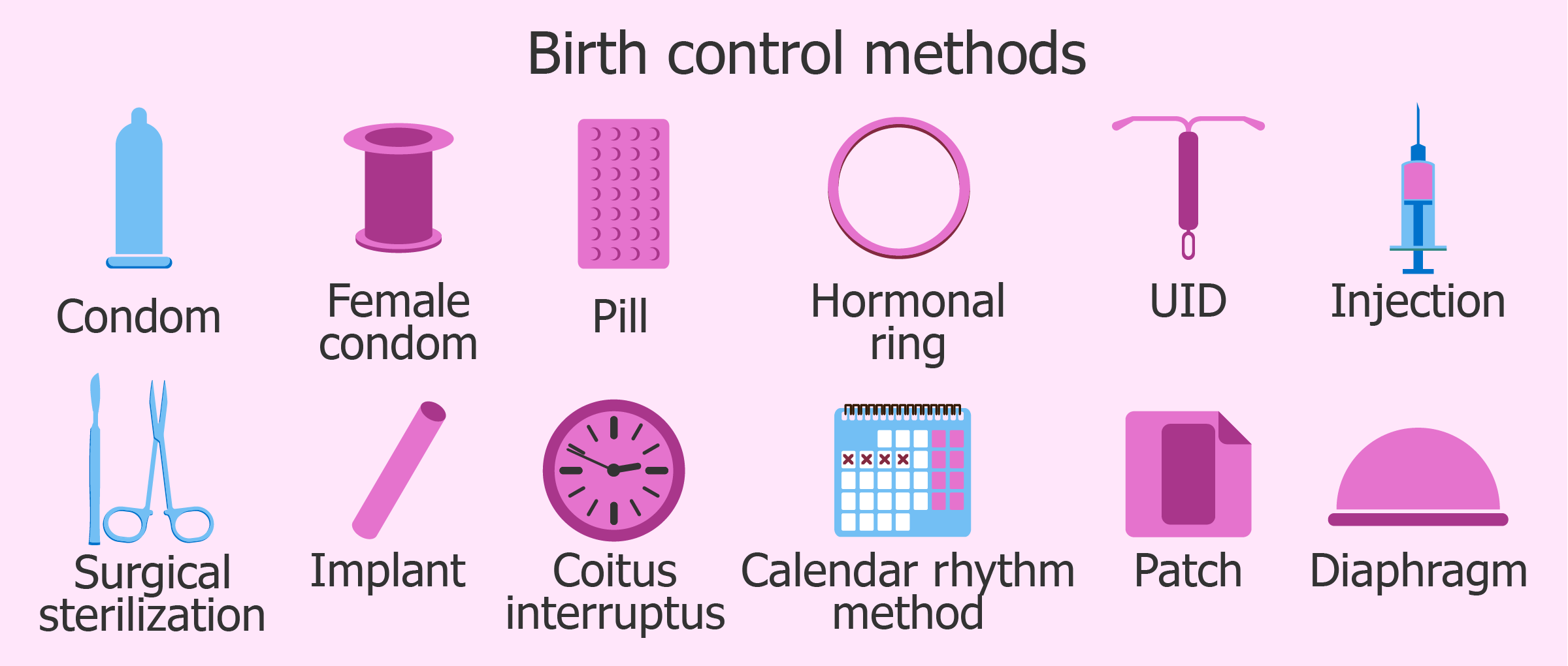
When you’re a young adult your choices for a birth control method might be different than that of a woman who is older or who is married. We think it’s important for you to know about birth control methods available today, even if you are not yet sexually active.
Contraception is a very important key to your sexual health and state of well being. Did you know that 25% of women who have intercourse without using a method of birth control will become pregnant within one month and 85% will become pregnant within one year.
Choosing a birth control method is a very personal decision, but one you might want to discuss with your sexual partner. To choose which birth control method to use, consider how well each one will work for you:
- How effective is it?
- How will it fit into your lifestyle?
- How safe is it?
- Is it affordable?
- Does it protect you from sexually transmitted diseases?
These are important questions that are worth taking some time to think about. Talk to your sexual partner or parent if you can. We hope that many of you can discuss these options with someone. Just a reminder or if you don’t already know… you can get a prescription for birth control without parental consent. You can also see a health care provider without anyone else knowing also. It’s your body and your privacy.
Methods Of Birth Control
- Abstinence
- Condoms ( male & female)
- Contraceptive creams, foams, jelly & suppositories – see Spermicides
- Contraceptive Sponge
- Depo-Provera (Hormonal Injections) & Lunelle– A monthly hormonal injection.
- Diaphragm
- The Pill
- Spermicides
- Emergency Contraception
- Lunelle – A once a month hormonal injection…
- For more on Depo-Provera — Go there…
- Want to know the benefits of the pill?
- For more on the Ortho Evra or “The Patch”; Also see faqs 22
- For more on the NuvaRing go there…
Methods Not Usually Recommended For Teenagers (but we think you should know about them).
For More Birth Control Statistics, see Birth Control 2…
For the thinnest latex in the world – Crown Condoms, Visit Condomania Online.
The IUD (Intrauterine Device) – a small plastic device inserted into the uterus that is often covered with copper. Some IUDs come in different shapes or contain hormones. The IUD rests inside the uterus. For more on the Mirena IUD, see that page, if you are an adult…
|
|||||||||||
Norplant System – a reversible, five year, low dose, progestin-only contraceptive. ** This product was taken off the market in the United States in July 2002, but we think you should know about it in case you or someone you know has it still.
|
|||||||||||
The Rhythm Method – Periodic Abstinence or Fertility Awareness Methods (FAMs) – a professional teaches a woman how to chart her menstrual cycle and to detect certain physical signs that help her predict “unsafe” days. She must abstain from intercourse (periodic abstinence) or use condoms (FAMs) during nine or more “unsafe” days. Includes:
|
|||||||||||
Sterilization – an operation to keep sperm from joining egg
|
|||||||||||
Withdrawal – the man pulls his penis out of the vagina before he “comes” to keep sperm from joining egg. This can hardly even be called a method of contraception.
|
If you have unprotected vaginal intercourse, you may need Emergency Contraception; also called Plan B
|
||||||
|
||||||
|
||||||
|
|
Effectiveness |
A woman’s risk of pregnancy varies from day to day during her menstrual cycle. |
|
Reason not recommended for teens |
Some teens may not have transportation to a clinic or health care provider available confidentially and as quickly as needed. This method must be used as soon as possible, 24-48 hours after sex and up to 72 hours. High doses of hormones can make teens very sick (hours of vomiting). |
Do You Trust Your Birth Control?
Written by: Christine Haran – Published on: September 15, 2004
 Everyone has heard horror stories about a condom breaking or a woman getting pregnant despite being on the pill. While no method of contraception offers a 100 percent guarantee, familiarity with the reasons why birth control fails, and knowing how to choose the method that matches your needs, can help couples keep their risk of unplanned pregnancy low.
Everyone has heard horror stories about a condom breaking or a woman getting pregnant despite being on the pill. While no method of contraception offers a 100 percent guarantee, familiarity with the reasons why birth control fails, and knowing how to choose the method that matches your needs, can help couples keep their risk of unplanned pregnancy low.
Does It Work?
While about half of all pregnancies in the United States are unintended, the Centers for Disease Control and Prevention’s National Survey of Family Growth found that more than 90 percent of women between 15 and 44 use contraception. When choosing a form of contraception, most women’s very first question is: “How well does it work?”
A method of contraception’s efficacy depends, primarily, upon how consistently and properly it is used. Certain surgical procedures and device methods — such as female sterilization, vasectomy and intrauterine devices (IUDs) — lend themselves to perfect use and fewer unintended pregnancies because once these procedures are performed, nothing more is required of the user. But what about the other types of birth control?
“The main source of contraceptive failure comes from those methods that require adhering to some schedule, such as birth control pills or condoms,” says James Trussell, PhD, director of the office of population research at Princeton University and the author of review on contraceptive failure published in the journal Contraception in August. “The main reason they fail is not that they are used and fail, but because of imperfect use.”
“Methods like condoms, cervical caps, diaphragms and spermicides, must be used every single time you have sex,” he continues. And things happen, condoms break and microscopic holes form in diaphragms, compromising the barrier between sperm and the vagina. But the most common mistake people make is not using any method at all. “The way these are most often misused is that they are in the bathroom cabinet or in the drawer next to the bed rather than in the vagina or on the penis,” he says. Likewise, women taking oral contraceptives may forget to take their pill.
How well a contraceptive methods works must be weighed in terms of perfect and typical use. This is the difference between following the method’s directions by the book and using it inconsistently and incorrectly. According to Dr. Trussell’s review, when using the male condom for example, 16 percent of women experienced an unintended pregnancy over the course of one year with typical use and 6 percent got pregnant with perfect use.
So What’s Right for You?
Of course, just because sterilization provides very effective protection, that doesn’t mean it’s the appropriate choice for you, especially if you plan to get pregnant in the future. Consequently, your age may play a major role in that decision. Age may also affect what kind of contraception you can afford and which contraception best fits into your lifestyle and level of sexual activity.
Another consideration is protection against sexually transmitted disease, which is one reason why Dr. Trussell and others advocate using two methods of contraception. “A dual method strategy where one uses condoms and birth control pill, for example, would provide not only extremely effective contraception protection but also protection against sexually transmitted diseases,” says Dr. Trussell.
If you’re deciding whether to go on oral contraceptives, you should consider how good a pill taker you are, or whether you’ve had success with this method in the past. If you have trouble remembering to take the pill each day, you might consider the patch, which has a sticky side that you attach to a part of the body and change weekly, or the ring, which is a device that is inserted into the vagina and changed weekly.
Health status and sensitivity to side effects are other considerations. If you are already at high risk for stroke, for example, oral contraceptives might not be a good choice. However, oral contraceptives might be ideal if you have acne or severe PMS or perimenopause symptoms. Likewise, contraceptives such as diaphragms and spermicides can increase risk of urinary tract infections, particularly among those who are already prone to them, but are nonetheless favored by many women over 30.
“The cardinal rule of contraceptive is that a woman or a couple needs to find a method that they can use correctly and consistently,” Trussell says. “We have a variety of contraceptives, and choice is good, because it increases the likelihood that an individual woman or couple can find the methods that is best for them.”
| Percentage of Women with an Unintended Pregnancy During the First Year of Typical Use and the First Year of Perfect Use of Contraception * | ||
|---|---|---|
| Method | Typical Use | Perfect Use |
| Male sterilization | 0.15 | 0.10 |
| Female sterilization | 0.5 | 0.5 |
| IUD: Copper T | 0.8 | 0.6 |
| IUD: levonorgesterel-containing intrauterine system |
0.1 | 0.1 |
| Depo-Provera | 3 | 0.3 |
| NuvaRing | 8 | 0.3 |
| Ortho-Evra patch | 8 | 0.3 |
| Combined pill and mini-pill | 8 | 0.3 |
| Male condom | 15 | 2 |
| Diaphragm | 16 | 6 |
| Withdrawal | 27 | 4 |
| Spermicides | 29 | 18 |
| No method | 85 | 85 |
* Adapted from Trussell, J. Contraceptive Technology, eighteenth edition revised. Ardent Media, 2004, © 2004 Healthology, Inc
Morning After Pill vs. Abortion Pill: What’s the Difference?
Birth Control Myths
Have you ever heard that you can’t get pregnant if you “do it” standing up or during your period? If you think that’s true, you better read Birth Control Myths and “ Can I Get Pregnant If” You’ll learn about lots of Birth Control Myths.
Condoms 101
Condom FAQs – Two pages that should answer most of your questions.
Be sure to check out our section on Contraception Focus:
For the thinnest latex in the world – Crown Condoms, Visit Condomania Online. “They Fit” Condoms in 55 sizes!
Check out Sex Ed 101 for answers to your sexual health questions.
